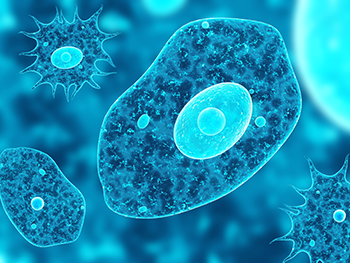Are Eukaryotes Bigger Than Prokaryotes
Scientists — and people in general — love to divide things into categories. In some ways, life on Earth has done the same. Correct at present, scientists tin divide cells into major categories — prokaryotes (or procaryotes; both spellings are okay) and eukaryotes.
Prokaryotes (PRO-kaer-ee-oats) are individualists. These organisms are minor and single-celled. They might form into loose clumps of cells. But prokaryotes volition never come together to take on different jobs within a unmarried organism, such as a liver cell or a encephalon cell.
Eukaryotic cells are generally bigger — up to ten times bigger, on average, than prokaryotes. Their cells also hold much more DNA than prokaryotic cells practise. To hold upwardly that large cell, eukaryotes have a cytoskeleton (Sy-toh-SKEL-eh-tun). Made from a network of protein threads, information technology forms a scaffold inside the cell to give it strength and help information technology motion.
Keeping it elementary
Prokaryotes brand upwardly two of the three big domains of life — those super kingdoms that scientists use to organize all living things. The domains of bacteria and archaea (Ar-KEY-uh) consist of prokaryotes only.
Scientists Say: Archaea
These single cells are minor, and usually round or rod shaped. They might have one or more flagella (Fla-JEL-uh) — powered tails — hanging off the exterior to move effectually. Prokaryotes oftentimes (only non always) accept a cell wall for protection.
Within, these cells throw together all they demand to survive. Merely prokaryotes aren't very organized. They let all their jail cell parts hang out together. Their Dna — the education manuals that tell these cells how to build everything they need — just floats around in the cells.
But don't let the mess fool yous. Prokaryotes are masterful survivors. Bacteria and archaea have learned to make meals of everything from sugars and sulfur, to gasoline and iron. They can get energy from sunlight or the chemicals spewed from deep-sea vents. Archaea in particular love extreme environments. They can be found in loftier-table salt springs, rock crystals in caves or the acidic stomachs of other organisms. That ways that prokaryotes are establish on and in most places on Globe — including inside our own bodies.
Eukaryotes go on it organized

Eukaryotes like to continue things tidy — organizing cell functions in dissimilar compartments.
frentusha/iStock/Getty Images Plus
Eukaryotes are the 3rd domain of life. Animals, plants and fungi all autumn under this umbrella, along with many other unmarried-celled organisms, such every bit yeast. Prokaryotes might be able to eat nigh anything, just these eukaryotes have other advantages.
These cells proceed themselves tidy and organized. Eukaryotes tightly fold and pack their DNA into a nucleus — a pouch inside each cell. The cells have other pouches, also, chosen organelles. These neatly manage other prison cell functions. For example, one organelle is in charge of poly peptide-making. Another disposes of trash.
Eukaryotic cells probably evolved from bacteria, and started out as hunters. They scooted around engulfing other, smaller cells. But some of those smaller cells didn't become digested after they were eaten. Instead, they stuck around inside their larger host. These smaller cells at present perform essential functions in eukaryotic cells.
Scientists Say: Mitochondrion
Mitochondria (My-toh-KON-dree-uh) may take been 1 of these early victims. They at present generate energy for eukaryotic cells. Chloroplasts (KLOR-oh-plasts) may have been some other small prokaryote "eaten" by a eukaryote. These now hang out converting sunlight into energy inside plants and algae.
While some eukaryote are loners — like yeast cells or protists — others relish teamwork. They may ring together into big conglomerations. These communities of cells often have the same Dna in each of their cells. Some of these cells, however, may use that DNA in different ways to perform special functions. One blazon of prison cell might control advice. Another might work on reproduction or digestion. The cell group then works as a squad to pass on the organism's Deoxyribonucleic acid. These communities of cells evolved to become what are at present known every bit plants, fungi and animals — including us.

Eukaryotes tin also piece of work together to build enormous, complex organisms — such as this equus caballus.
AsyaPozniak/iStock/Getty Images Plus
Are Eukaryotes Bigger Than Prokaryotes,
Source: https://www.snexplores.org/article/explainer-prokaryotes-and-eukaryotes
Posted by: owenscrind1984.blogspot.com



0 Response to "Are Eukaryotes Bigger Than Prokaryotes"
Post a Comment